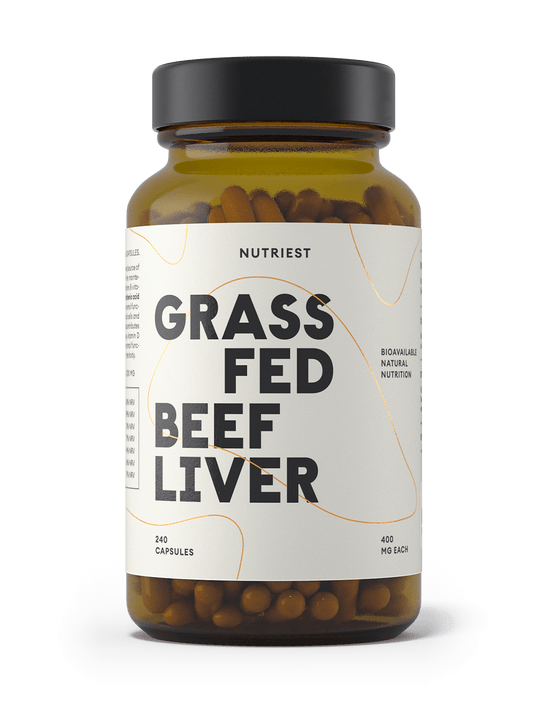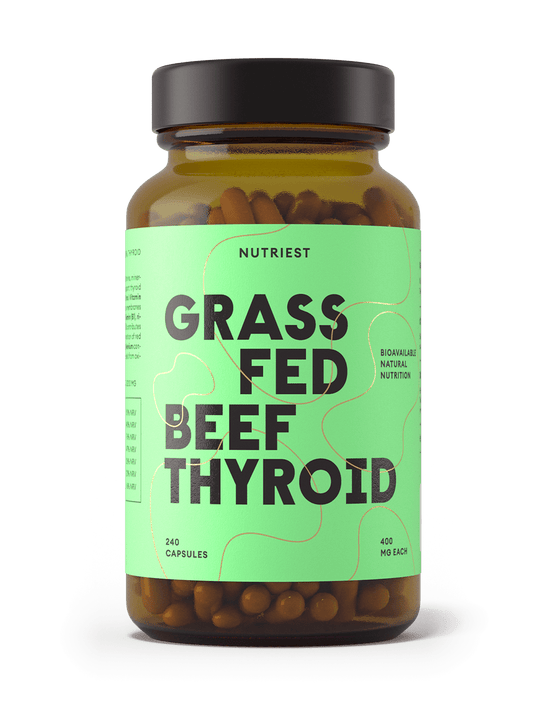If you want to increase your energy and improve your health at the cellular level, there's no way around the right diet to strengthen your mitochondria . Mitochondria, often referred to as the "powerhouses of the cells," are crucial for your body's energy production. Their function not only determines how fit and alert you feel, but also influences aging processes, immune defense, and mental performance.
The central thesis of this article is: With a targeted, mitochondria-friendly diet, you can activate your metabolism, reduce cellular stress, and noticeably increase your vitality. Current findings—including those from Ray Peat—show that certain fats, sugars, hormones, and micronutrients play a crucial role. In this article, you'll learn how to strengthen your body from the inside out through simple yet effective dietary changes.
Nutrition to strengthen your mitochondria
Your mitochondria need targeted nutrients to function optimally. While many diets focus on burning fat, Ray Peat emphasizes that glucose —or sugar—is the preferred energy source for your cells. So, if you want to strengthen your mitochondria , don't be afraid of natural carbohydrates. Fruit juices, honey, root vegetables, and white rice provide readily available energy and promote cellular respiration more effectively than fats.
Another key aspect is avoiding PUFAs (polyunsaturated fatty acids), which, according to Peat, damage mitochondrial membranes and promote oxidative processes. Instead, focus on saturated fats such as palmitic acid , which is found in coconut oil and butter. These stabilize cell structure and support the function of the respiratory chain —a crucial enzyme system in the mitochondria.
Additionally, your cells need certain micronutrients to produce energy efficiently. These include vitamin B1 , magnesium , niacin , and biotin —all of which play a role in energy metabolism. A diet rich in liver, eggs, dairy products, and seafood provides you with optimal amounts of these substances.
In summary, if you want to improve your cellular energy , you should focus on natural sources of sugar, saturated fats, and micronutrient-rich foods—while eliminating PUFA-rich vegetable oils such as rapeseed, soybean, or sunflower oil from your kitchen.
Activate your thyroid – boost energy production
The thyroid gland sets the pace of your metabolism. Its hormones—especially T3 (triiodothyronine) —directly influence how active your mitochondria are. A well-functioning thyroid ensures high oxygen utilization, a stable body temperature, and mental clarity. However, when thyroid activity is impaired, your entire metabolism slows down—leaving you feeling tired, cold, and listless.
Studies show that approximately 15 to 20% of the population in Europe suffers from subclinical hypothyroidism, often without knowing it. Women are particularly affected because estrogen can block thyroid hormone production and slow energy metabolism. In this condition, lactate production increases, which in turn suppresses cellular energy production —a central theme in Ray Peat's research.
Ray Peat emphasizes that certain foods can naturally stimulate the thyroid. These include:
-
Beef liver (rich in vitamin A, copper and B vitamins),
-
Seafood (provides iodine and selenium),
-
Coconut oil , which is rich in palmitic acid and supports thyroid hormone action,
-
as well as dairy products , which provide calcium and high-quality proteins.
In addition, light (especially sunlight) and adequate calorie intake promote thyroid function. Diets with a severe calorie deficit, on the other hand, lead to a decrease in T3 production—and thus to less energy.
So, if you want to boost your metabolism and improve your cellular energy , start by supporting your thyroid. With the right diet, light, and stress reduction, you can get your internal energy engine running again.
The underestimated danger of PUFAs
When it comes to healthy eating, many people still believe that vegetable oils like sunflower, rapeseed, or soybean oil are healthy. But this is precisely where a common misconception lies. These oils contain large amounts of so-called PUFAs – polyunsaturated fatty acids – which, according to Ray Peat, can cause significant damage to your mitochondria .
🧬 Why are PUFAs problematic?
PUFAs are unstable and easily oxidize at body temperature. These oxidation processes generate free radicals that attack your cell membranes, DNA, and especially mitochondria. Studies show that oxidized PUFAs can lead to inflammation, insulin resistance, and accelerated cell deterioration . In animal studies, even low levels of PUFA have been linked to a reduced lifespan.
PUFAs also indirectly promote glycolysis —the metabolic pathway that produces lactate (lactic acid) instead of energy. Ray Peat strongly warns against this, as lactate inhibits glucose oxidation and disrupts mitochondrial energy production. The consequences: You feel tired, mentally slow, and more prone to inflammation.
❓ Frequently asked questions and concerns
“But omega-3 fatty acids are healthy, right?”
Omega-3 fatty acids are also PUFAs. While they have short-term anti-inflammatory effects, Ray Peat argues that they also promote oxidative stress in the long term. Instead, he recommends focusing on saturated fats from animal sources and coconut oil .
“Isn’t it dangerous to avoid vegetable oils?”
No – quite the opposite. Many essential nutrients, such as fat-soluble vitamins (A, D, E, K), are more readily available in animal fats. Saturated fats are also oxidation-stable and support cell membranes.
“What can I use instead?”
Reach for butter, coconut oil, ghee, or beef tallow . According to Ray Peat, these fats not only support your thyroid function but also cellular energy production —thus helping to avoid PUFAs .
Optimize cellular energy – beyond calories
Many people measure health solely by calorie intake. But according to Ray Peat, it's not the amount of calories that matters, but how efficiently your cells can extract energy from them . The goal is to improve cellular energy —the ability of your mitochondria to convert food into usable energy (ATP).
A central problem of modern lifestyles is the excessive use of glycolysis – a cellular emergency mechanism that converts glucose into lactate (lactic acid) . This pathway provides only a fraction of the energy generated through oxidative phosphorylation – and leads to the accumulation of lactate, which in turn inhibits mitochondria. Studies have linked increased lactate production to chronic fatigue, Alzheimer's disease, and even heart failure.
To improve cellular energy , Peat recommends:
-
Light therapy , as red light activates the respiratory chain in the mitochondria
-
Thyroid hormone support to increase oxygen utilization
-
Vitamin B1 and biotin , which are essential cofactors in energy metabolism
-
Palmitic acid , found in coconut oil , to promote respiration
-
Avoidance of lactic acidosis through stress-free breathing, CO₂ rebreathing and good thyroid function
Progesterone , which Peat calls a "hormonal shield," also plays a role. It stabilizes cell membranes, reduces lactate formation, and protects the brain from mitochondrial stress.
Ray Peat Nutrition – a holistic approach
The so-called Ray Peat diet is more than just a meal plan—it's a concept for increasing your cellular health and mental clarity. Instead of fads or restrictive diets, it's based on physiological logic and the goal of improving metabolism and mitochondrial function .
Core principles of the Ray Peat diet:
-
Focus on glucose-based energy sources (fruit juices, honey, roots)
-
Preference for saturated fats instead of PUFAs
-
Daily consumption of animal proteins such as milk, eggs, gelatin and liver
-
Supply of micronutrients such as calcium, magnesium, selenium, vitamins A, D, K2 and B complex
-
Avoid estrogenic substances (e.g. soy products), as estrogen inhibits the mitochondria
-
Promote CO₂ production through calm breathing and gentle movement, as CO₂ inhibits lactate formation
The results of this diet are evident not only in increased energy, but also in better sleep, clearer skin, improved focus, and hormonal balance. Many people report noticeable improvements after just a few weeks.
Conclusion: Your path to sustainable energy
If you want to improve your long-term health and feel energized again, it's worth taking a look at mitochondria—your cellular powerhouses . As you've learned in this article, you can directly influence their function through proper nutrition and targeted lifestyle choices.
Here are the most important points at a glance:
✅ Strengthen your mitochondria through a nutrient-rich, glucose-based diet – with fruit juices, root vegetables, dairy products and liver.
✅ Avoid PUFAs as they inhibit mitochondrial function and your metabolism.
✅ Activate your thyroid to boost your energy metabolism naturally.
✅ Optimize your cellular energy production by making targeted use of light, breathing and supporting micronutrients.
✅ Live according to the principles of the Ray Peat diet to bring body and mind into long-term harmony.
🔔 Now it's your turn : Start incorporating one or two of these principles into your daily routine today—for example, replace vegetable oils with coconut oil or start your day with a glass of freshly squeezed orange juice. Your cells will thank you.
👉 Share this post if you know someone who is often tired, listless or under constant stress – maybe he or she just needs a little boost for more energy from within.
This article is based on the original article by Ray Peat: https://raypeat.com/articles/articles/mitochondria-mortality.shtml





